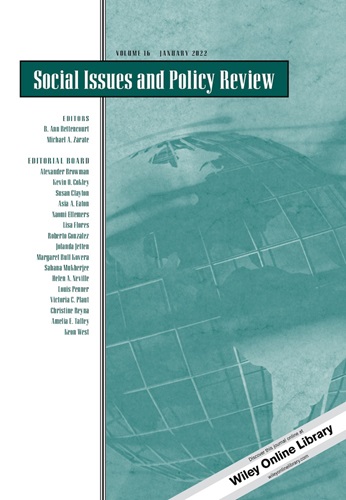A Developmental Science Approach to Reducing Prejudice and Social Exclusion: Intergroup Processes, Social‐Cognitive Development, and Moral Reasoning
IF 5.6
1区 心理学
Q1 PSYCHOLOGY, SOCIAL
引用次数: 227
Abstract
This article presents a developmental science approach to changing attitudes and rectifying prejudice and discrimination. This is crucial because stereotypes and prejudicial attitudes are deeply entrenched by adulthood; the time for intervention is before biases are fully formed in adulthood. Adults as well as children are both the recipients and the perpetrators of prejudice as reflected by social exclusion based on group membership. Determining the factors that inhibit or reduce the negative outcomes of prejudice and exclusion is of paramount importance. Research reveals that young children are aware of in-group and out-group differences very early but what becomes full-fledged prejudice, in fact, emerges slowly during childhood and adolescence. At the same time, morality, an understanding of fairness and equality, emerges during this same time period. On the positive side, evidence reveals that in certain contexts, children understand the unfairness of prejudicial attitudes and social exclusion designed to inflict harm on others. On the negative side, prejudicial attitudes, even when not intentional, have detrimental consequences for children as targets of biased attitudes. This article describes research on social reasoning, moral judgments, group identity, group norms, and intergroup contact in childhood to shed light on the catalysts and obstacles that exist for the goal of promoting the development of positive intergroup attitudes from early childhood to adulthood. Implications for policy and intervention are provided.减少偏见和社会排斥的发展科学方法:群体间过程、社会认知发展和道德推理
本文提出了一种发展科学的方法来改变态度,纠正偏见和歧视。这一点至关重要,因为陈规定型观念和偏见态度在成年后根深蒂固;干预的时机是在偏见在成年期完全形成之前。成人和儿童都是偏见的接受者和施暴者,这反映在基于群体成员的社会排斥上。确定抑制或减少偏见和排斥的负面结果的因素是至关重要的。研究表明,幼儿很早就意识到群体内和群体外的差异,但事实上,在儿童和青少年时期,形成全面偏见的速度很慢。与此同时,道德,一种对公平和平等的理解,也在同一时期出现。从积极的方面看,有证据表明,在某些情况下,儿童理解旨在伤害他人的偏见态度和社会排斥的不公平。在消极方面,偏见态度,即使不是故意的,也会对儿童造成有害的后果,使其成为偏见态度的对象。这篇文章描述了社会推理、道德判断、群体认同、群体规范和儿童时期的群体间接触的研究,以揭示从儿童早期到成年时期促进积极群体间态度发展的催化剂和障碍。提供了政策和干预的含义。
本文章由计算机程序翻译,如有差异,请以英文原文为准。
求助全文
约1分钟内获得全文
求助全文
来源期刊

Social Issues and Policy Review
Multiple-
CiteScore
22.20
自引率
1.10%
发文量
9
期刊介绍:
The mission of Social Issues and Policy Review (SIPR) is to provide state of the art and timely theoretical and empirical reviews of topics and programs of research that are directly relevant to understanding and addressing social issues and public policy.Papers will be accessible and relevant to a broad audience and will normally be based on a program of research. Works in SIPR will represent perspectives directly relevant to the psychological study of social issues and public policy. Contributions are expected to be review papers that present a strong scholarly foundation and consider how research and theory can inform social issues and policy or articulate the implication of social issues and public policy for theory and research.
 求助内容:
求助内容: 应助结果提醒方式:
应助结果提醒方式:


